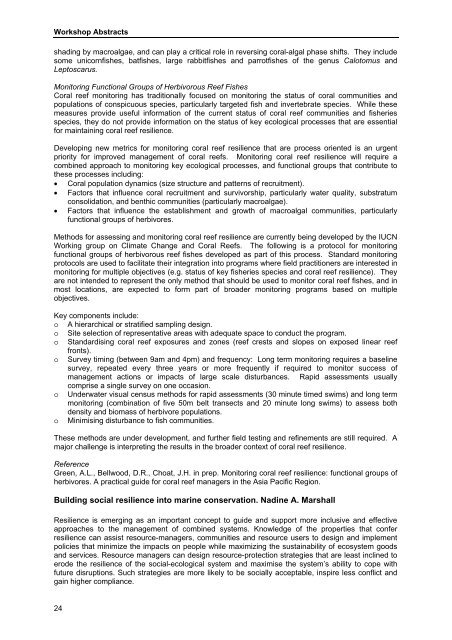Obura2009-IUCN Congress report - Resilience sessions
Obura2009-IUCN Congress report - Resilience sessions.pdf
Obura2009-IUCN Congress report - Resilience sessions.pdf
Create successful ePaper yourself
Turn your PDF publications into a flip-book with our unique Google optimized e-Paper software.
Workshop Abstracts<br />
shading by macroalgae, and can play a critical role in reversing coral-algal phase shifts. They include<br />
some unicornfishes, batfishes, large rabbitfishes and parrotfishes of the genus Calotomus and<br />
Leptoscarus.<br />
Monitoring Functional Groups of Herbivorous Reef Fishes<br />
Coral reef monitoring has traditionally focused on monitoring the status of coral communities and<br />
populations of conspicuous species, particularly targeted fish and invertebrate species. While these<br />
measures provide useful information of the current status of coral reef communities and fisheries<br />
species, they do not provide information on the status of key ecological processes that are essential<br />
for maintaining coral reef resilience.<br />
Developing new metrics for monitoring coral reef resilience that are process oriented is an urgent<br />
priority for improved management of coral reefs. Monitoring coral reef resilience will require a<br />
combined approach to monitoring key ecological processes, and functional groups that contribute to<br />
these processes including:<br />
• Coral population dynamics (size structure and patterns of recruitment).<br />
• Factors that influence coral recruitment and survivorship, particularly water quality, substratum<br />
consolidation, and benthic communities (particularly macroalgae).<br />
• Factors that influence the establishment and growth of macroalgal communities, particularly<br />
functional groups of herbivores.<br />
Methods for assessing and monitoring coral reef resilience are currently being developed by the <strong>IUCN</strong><br />
Working group on Climate Change and Coral Reefs. The following is a protocol for monitoring<br />
functional groups of herbivorous reef fishes developed as part of this process. Standard monitoring<br />
protocols are used to facilitate their integration into programs where field practitioners are interested in<br />
monitoring for multiple objectives (e.g. status of key fisheries species and coral reef resilience). They<br />
are not intended to represent the only method that should be used to monitor coral reef fishes, and in<br />
most locations, are expected to form part of broader monitoring programs based on multiple<br />
objectives.<br />
Key components include:<br />
o A hierarchical or stratified sampling design.<br />
o Site selection of representative areas with adequate space to conduct the program.<br />
o Standardising coral reef exposures and zones (reef crests and slopes on exposed linear reef<br />
fronts).<br />
o Survey timing (between 9am and 4pm) and frequency: Long term monitoring requires a baseline<br />
survey, repeated every three years or more frequently if required to monitor success of<br />
management actions or impacts of large scale disturbances. Rapid assessments usually<br />
comprise a single survey on one occasion.<br />
o Underwater visual census methods for rapid assessments (30 minute timed swims) and long term<br />
monitoring (combination of five 50m belt transects and 20 minute long swims) to assess both<br />
density and biomass of herbivore populations.<br />
o Minimising disturbance to fish communities.<br />
These methods are under development, and further field testing and refinements are still required. A<br />
major challenge is interpreting the results in the broader context of coral reef resilience.<br />
Reference<br />
Green, A.L., Bellwood, D.R., Choat, J.H. in prep. Monitoring coral reef resilience: functional groups of<br />
herbivores. A practical guide for coral reef managers in the Asia Pacific Region.<br />
Building social resilience into marine conservation. Nadine A. Marshall<br />
<strong>Resilience</strong> is emerging as an important concept to guide and support more inclusive and effective<br />
approaches to the management of combined systems. Knowledge of the properties that confer<br />
resilience can assist resource-managers, communities and resource users to design and implement<br />
policies that minimize the impacts on people while maximizing the sustainability of ecosystem goods<br />
and services. Resource managers can design resource-protection strategies that are least inclined to<br />
erode the resilience of the social-ecological system and maximise the system’s ability to cope with<br />
future disruptions. Such strategies are more likely to be socially acceptable, inspire less conflict and<br />
gain higher compliance.<br />
24


















